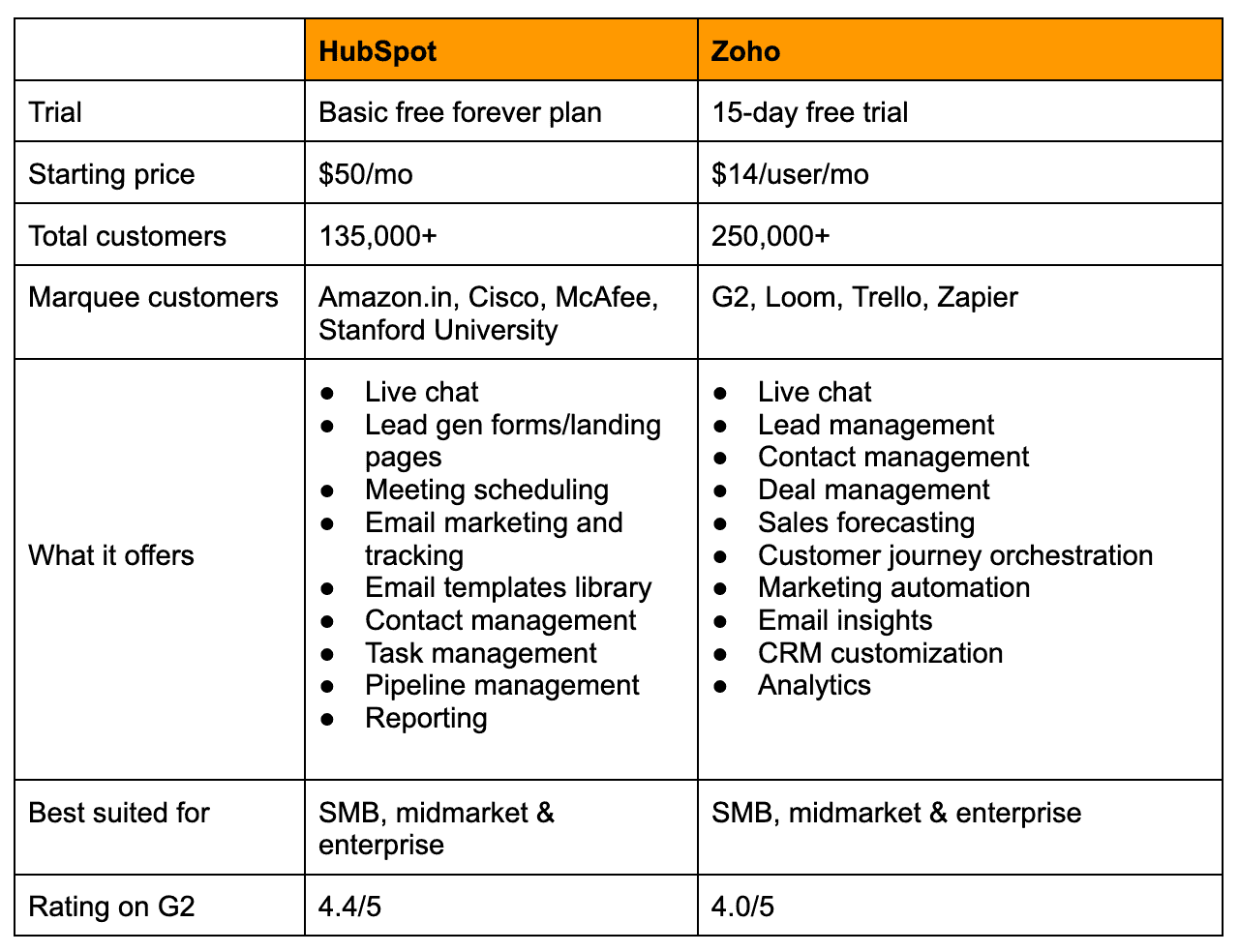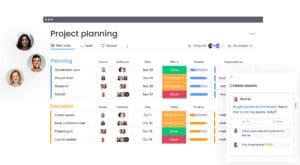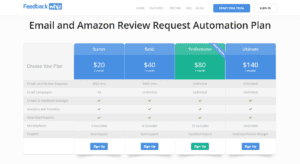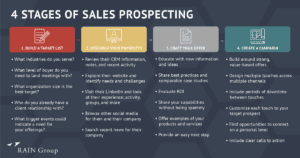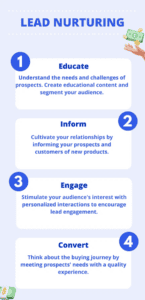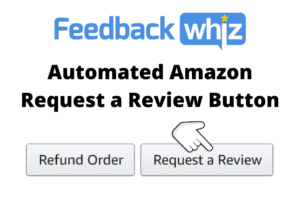HubSpot vs. Zoho CRM: Which One to Choose?
Find out whether HubSpot or Zoho CRM is the ideal customer relationship management solution for your business needs.
Introduction
Choosing the right customer relationship management (CRM) software is crucial for businesses aiming to streamline operations, improve customer interactions, and drive sales growth. HubSpot and Zoho CRM are two of the most popular CRM platforms available today. Both offer robust features designed to meet various business needs, but which one is the best fit for you? This comprehensive comparison will delve into their features, pricing, integrations, and user experience to help you make an informed decision.
Overview of HubSpot and Zoho CRM
Before diving into the specifics, let’s briefly introduce both platforms.
HubSpot CRM
HubSpot CRM is a free, user-friendly CRM platform designed to help businesses manage customer relationships effectively. It offers a suite of tools for contact management, sales pipeline visibility, email integration, and real-time analytics. HubSpot also provides Marketing, Sales, and Service Hubs that can be integrated for enhanced functionality.
Zoho CRM
Zoho CRM is part of the Zoho suite of business applications. It offers a comprehensive set of CRM features, including lead management, sales automation, analytics, and customization options. Zoho CRM is known for its affordability and flexibility, making it a popular choice for small to medium-sized businesses.
Feature Comparison
Understanding the features each platform offers can help you determine which one aligns with your business requirements.
Contact and Lead Management
Efficient contact and lead management are fundamental to any CRM.
HubSpot CRM
- Unified Contact Database: Centralize all customer interactions and information.
- Lead Capture Forms: Create forms to capture leads directly into the CRM.
- Email Tracking: Monitor email opens and clicks for better follow-up.
Zoho CRM
- Lead Scoring: Assign scores to leads based on engagement levels.
- Workflow Automation: Automate lead nurturing processes.
- Social Media Integration: Engage with leads through social channels.
Summary: HubSpot excels in email tracking and ease of use, while Zoho offers advanced lead scoring and social media engagement.
Sales Pipeline Management
Managing your sales pipeline effectively can boost conversion rates.
HubSpot CRM
- Visual Sales Pipeline: Drag-and-drop interface to move deals through stages.
- Deal Tracking: Monitor deal progress with real-time updates.
- Multiple Pipelines: Create custom pipelines for different products or services.
Zoho CRM
- Advanced Analytics: In-depth sales forecasts and trend analysis.
- Territory Management: Assign regions to sales reps for better organization.
- Quota Management: Set and track sales targets for your team.
Summary: HubSpot provides an intuitive pipeline interface, while Zoho offers more advanced analytics and territory management.
Customization and Scalability
The ability to customize and scale is essential for growing businesses.
HubSpot CRM
- Custom Fields: Add fields to capture specific information.
- Integrations: Seamlessly integrate with HubSpot’s Marketing, Sales, and Service Hubs.
- User Permissions: Control access levels for different team members.
Zoho CRM
- Customization: Extensive options for modules, fields, and layouts.
- Marketplace Apps: Access to over 500 extensions and integrations.
- Multi-Language Support: Operate in multiple languages for global teams.
Summary: Zoho CRM offers greater customization and a wider range of integrations, making it more scalable for diverse needs.
Automation Capabilities
Automation saves time and ensures consistency in customer interactions.
HubSpot CRM
- Email Sequences: Automate follow-up emails.
- Workflow Automation: Trigger actions based on contact behavior.
- Meeting Scheduling: Integrate calendars for easy appointment setting.
Zoho CRM
- Blueprints: Design and automate sales processes.
- Macro Automation: Execute a series of actions with a single click.
- AI Assistant Zia: Use AI for predictions, suggestions, and data analysis.
Summary: Zoho CRM offers more advanced automation features, including AI capabilities, while HubSpot provides straightforward automation suitable for smaller teams.
Reporting and Analytics
Access to real-time data helps in making informed decisions.
HubSpot CRM
- Customizable Dashboards: Tailor dashboards to display key metrics.
- Sales Analytics: Track team performance and deal progression.
- Activity Reports: Monitor calls, emails, and meetings.
Zoho CRM
- Advanced Analytics: Create custom reports and dashboards.
- Forecasting: Predict future sales based on historical data.
- KPI Tracking: Monitor key performance indicators across the organization.
Summary: Both platforms offer robust analytics, but Zoho CRM provides more advanced reporting options.
Integration and Compatibility
Integration with existing tools enhances productivity.
HubSpot CRM
- Email Integration: Sync with Gmail, Outlook, and other email clients.
- Third-Party Apps: Integrate with Slack, Zapier, and more.
- HubSpot Suite: Seamless integration with other HubSpot products.
Zoho CRM
- Zoho Suite Integration: Connect with Zoho’s extensive range of business apps.
- Third-Party Integrations: Integrate with Mailchimp, Google Apps, and others.
- API Access: For custom integrations and development.
Summary: HubSpot offers seamless integration within its ecosystem, while Zoho CRM provides broader integration options, especially within the Zoho suite.
Pricing Comparison
Budget is a crucial factor when selecting a CRM.
HubSpot CRM
- Free Plan: Includes basic CRM features suitable for small businesses.
- Paid Plans: Start at $50/month per user for additional features in Sales Hub.
- Scaling Costs: Costs can increase significantly as you add more features and users.
Zoho CRM
- Free Plan: Limited to 3 users with basic features.
- Standard Plan: Starts at $14/month per user.
- Enterprise Plan: Up to $52/month per user with advanced features.
Summary: Zoho CRM generally offers more affordable pricing options, especially for small to medium-sized businesses.
Pricing Comparison Table
| Plan | HubSpot CRM | Zoho CRM |
|---|---|---|
| Free | Yes (unlimited users) | Yes (up to 3 users) |
| Entry-Level Paid | $50/month per user | $14/month per user |
| Enterprise Level | $1,200/month (10 users) | $52/month per user |
| Additional Costs | Add-ons for Marketing, etc. | Add-ons for AI, etc. |
Prices are subject to change; always check the official websites for the latest information.
User Experience and Support
Ease of use and customer support are vital for smooth operations.
HubSpot CRM
- User Interface: Clean and intuitive, easy for beginners.
- Customer Support: Email and chat support available; phone support for higher-tier plans.
- Training Resources: Extensive library of tutorials, webinars, and the HubSpot Academy.
Zoho CRM
- User Interface: Feature-rich but may have a steeper learning curve.
- Customer Support: 24/5 support via email, chat, and phone.
- Training Resources: Zoho University offers tutorials and certification programs.
Summary: HubSpot is known for its user-friendly interface and extensive free training resources, while Zoho CRM offers comprehensive support with more learning materials.
Pros and Cons
Understanding the strengths and weaknesses can help in decision-making.
HubSpot CRM
Pros:
- Free to start with essential features.
- User-friendly interface.
- Seamless integration with HubSpot’s Marketing and Sales Hubs.
Cons:
- Costs can escalate with added features.
- Limited customization compared to Zoho CRM.
- Advanced features require higher-tier plans.
Zoho CRM
Pros:
- Affordable pricing plans.
- Extensive customization and scalability.
- Advanced automation and AI features.
Cons:
- Steeper learning curve.
- Limited features in the free version.
- Some integrations may require additional costs.
Ideal Use Cases
- HubSpot CRM: Ideal for small businesses and startups looking for a free, easy-to-use CRM with strong marketing integrations.
- Zoho CRM: Suited for growing businesses that need advanced customization, automation, and scalability at an affordable price.
Conclusion
Both HubSpot and Zoho CRM offer robust solutions for managing customer relationships. HubSpot CRM stands out for its user-friendly interface and seamless integration with marketing tools, making it ideal for businesses focusing on inbound marketing. Zoho CRM, on the other hand, offers extensive customization and advanced features at a more affordable price point, suitable for businesses looking for scalability and deeper automation.
Evaluate your specific needs, budget, and future growth plans to decide which CRM aligns best with your business objectives.
FAQs
1. Can I switch from HubSpot CRM to Zoho CRM or vice versa?
Yes, both platforms allow data import and export, making it possible to switch CRMs. However, consider the time and resources required for data migration and team retraining.
2. Does HubSpot CRM offer a mobile app?
Yes, HubSpot CRM provides mobile apps for both iOS and Android devices, allowing you to manage your CRM on the go.
3. Can Zoho CRM integrate with third-party applications?
Absolutely. Zoho CRM offers integrations with various third-party applications, including email clients, marketing tools, and social media platforms.
4. Is customer support free on both platforms?
Both offer free customer support, but the level of support may vary depending on your subscription plan. Higher-tier plans often include priority support.
5. Do both CRMs support multi-language and multi-currency?
Yes, both HubSpot and Zoho CRM support multiple languages and currencies, making them suitable for global businesses.
6. Can I customize the CRM according to my business processes?
- HubSpot CRM: Offers customization options but is somewhat limited compared to Zoho.
- Zoho CRM: Provides extensive customization capabilities, including custom modules and fields.
7. Are there any hidden costs in either CRM?
Additional features, integrations, or higher levels of customer support may incur extra costs. It’s essential to review the pricing plans carefully.
Top CRM Tools for Your Business
Enhance your customer relationship management with these top tools:
HubSpot CRM
A free, user-friendly CRM ideal for small businesses focusing on inbound marketing and seamless integration with HubSpot’s suite of tools.
Zoho CRM
An affordable and customizable CRM offering advanced automation and AI features, suitable for businesses seeking scalability.
Vendasta
Provides a comprehensive platform for agencies and small businesses to manage sales, marketing, and customer relationships effectively.
Salesforce
A leading CRM platform offering extensive features and integrations, ideal for large enterprises with complex needs.
Pipedrive
A sales-focused CRM that helps teams manage leads and deals efficiently with a visual sales pipeline.
Keywords: HubSpot vs Zoho CRM, CRM comparison, customer relationship management, CRM tools, sales pipelines, HubSpot features, Zoho CRM features, CRM pricing, business growth, CRM integration

